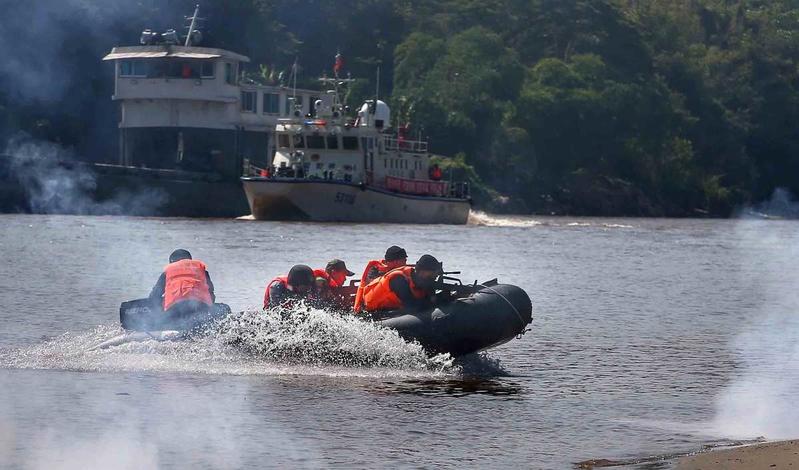 A joint drill is conducted by border police forces from China, Laos, Thailand and Myanmar on the Mekong River in November. (ZHANG ZHENG / FOR CHINA DAILY)
A joint drill is conducted by border police forces from China, Laos, Thailand and Myanmar on the Mekong River in November. (ZHANG ZHENG / FOR CHINA DAILY)
In November 2011, China, Laos, Thailand and Myanmar agreed to set up a joint command of armed police forces to escort commercial vessels on the Mekong River.
The decision was made in response to the murders of 13 Chinese sailors on two cargo vessels on the Thai section of the river on Oct 5, 2011.
The Mekong, known as the Lancang River in China, is a vital waterway for cross-border shipping between China, Laos, Myanmar, Thailand, Cambodia and Vietnam, and is playing a growing role in regional trade. In recent years, China and other countries along the river have committed to regional integration and development.
The 2011 attack prompted the plan to conduct joint law enforcement along the Mekong that the four nations had been mulling for years
The 2011 attack prompted the plan to conduct joint law enforcement along the Mekong that the four nations had been mulling for years. An agreement was reached in Beijing on Oct 31, 2011, which paved the way for deepening transnational cooperation in policing the river.
Under the framework, the quartet jointly patrols the China-Laos section of the river around the clock, supplying escorts for commercial vessels and combating cross-border crime. The patrols safeguard the 70 million people living in the river basin and international commercial vessels traveling along the river.
The enhanced efforts will help deter various criminal groups operating along the river, especially in the so-called Golden Triangle, a notorious haven for drug traffickers, pirates and gangsters, who pose a growing threat to human life and property.
The joint patrols have set a precedent for more transnational cooperation in regional security issues. The patrols have greatly strengthened security on the Mekong, which will provide more safety for transnational and cross-border trade.
By the end of November, 88 patrols had been undertaken successfully.
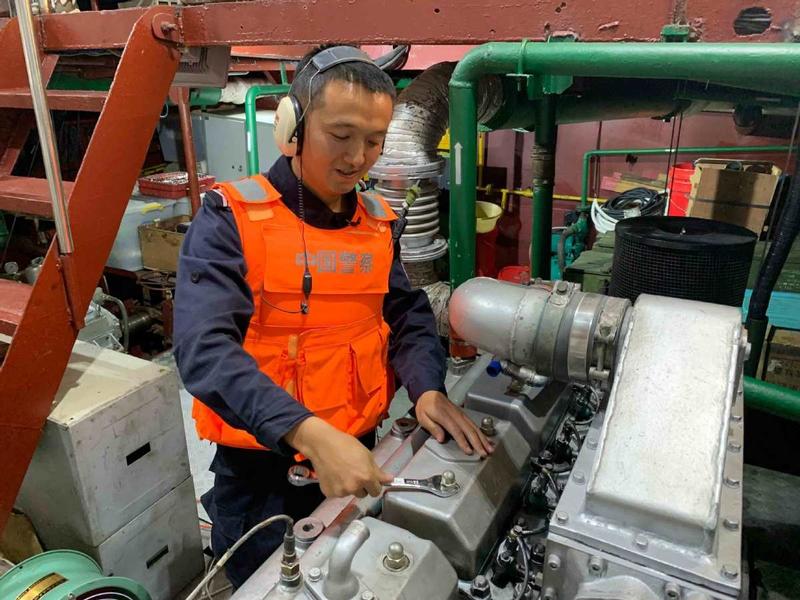 Wang Dong does maintenance work on a machine onboard. (PHOTO / CHINA DAILY)
Wang Dong does maintenance work on a machine onboard. (PHOTO / CHINA DAILY)
The mechanic: Wang Dong, 33
I was born in Nanchong in the east of Sichuan province in 1986. When I was young, I thought it was cool to be a soldier, so I joined the People's Armed Police Force at age 18.
As a teenager, I was fascinated by machinery and was always dismantling and assembling simple devices. So, when I was offered the chance to attend a military academy to study mechanical and electrical engineering, I agreed and passed the entrance exam easily.
After two years, I graduated from the academy and was dispatched to the vehicle repair unit of the border defense force in Yunnan. I spent eight years in the unit, and grasped the principles of vehicle maintenance and repair so well that I could identify problems just by listening to a faulty vehicle.
In August 2016, I was transferred to the border patrol. Some of the senior officers told me that I might have to take part in the joint patrols on the Mekong River. I realized that they wanted me there because of my engineering background, so I prepared by reading books about ship repairs and maintenance.
However, when I was on board and started a five-day patrol on the river, I found it hard to put the things I had learned into use because whenever there was a technical malfunction on the ship, it always seemed to happen in unexpected situations that required experience more than technical knowledge.
On a joint patrol a few years ago, our ship stopped moving during a night crossing of the China-Laos border. I thought the cause could be an engine problem or a technical error, but after checking for a few hours, I could not find any faults. We had to wait for help.
The next morning, a ship came to help us, and as we were towed free we discovered that our ship had simply been wedged between submerged rocks. It was then that I realized why my captain said that the best compliment for a technician is to be called "professional" and "experienced".
I think I am close to earning that kind of compliment, having taken part in many patrols and solved different problems. But now, I would rather be a qualified father as I am too busy to be with my two children and can only spend one month a year with them.
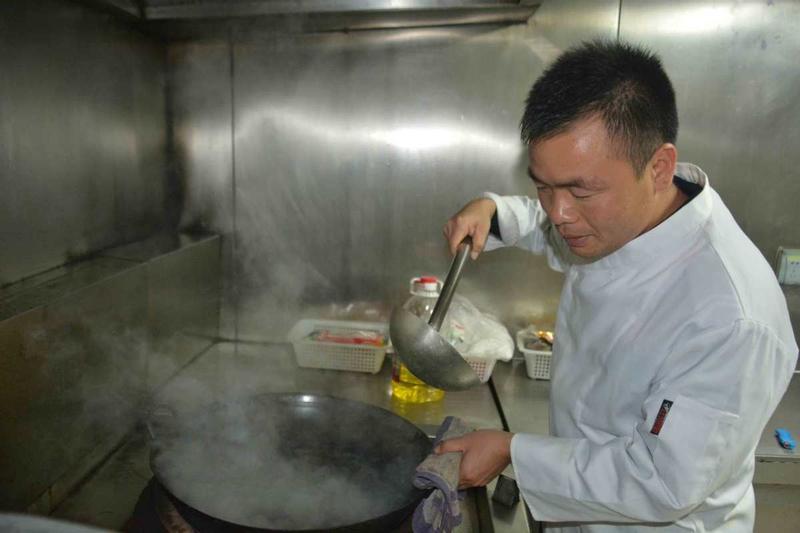 Wu Shuangping cooks a meal on the ship last year. (PHOTO / CHINA DAILY)
Wu Shuangping cooks a meal on the ship last year. (PHOTO / CHINA DAILY)
The cook: Wu Shuangping, 32
Before I was appointed as chef on my ship, I could not get used to eating hot, sour southwestern cuisine, let alone cooking it, as I come from Zhejiang province where most of the local dishes are pretty light.
I used to find it funny to see people sweating profusely when eating spicy food, but adding more chilies. Now, having spent years taking part in joint patrols and trying different things to cater for all tastes, I love spicy food.
My experience of spicy food started during my first patrol in February 2012. Before the ship sailed, I thought we would be conducting an ordinary patrol like the ones I experienced during my service with the People's Armed Police Force in Fujian province from 2007 to 2011.
When we went on board, our senior officer said there was no professional cook on the ship, so we would have to fend for ourselves. As a result, I ate some unpalatable food, cooked by people who I believe had never touched a frying pan before.
We took turns to cook, and one morning, my shift came. I had only tried making the simplest food before, so I braced myself and followed a recipe in a cookbook step by step to make a meal.
To my surprise, it was quite successful, and I received compliments from my comrades. I didn't know whether I was gifted or just lucky. Anyway, it was at least edible, as I noticed some of them asking for more.
After that, I always enjoyed the days when it was my turn to cook, and I started learning more recipes from books and the internet. In 2014, my comrades decided to cancel the cooking shifts and asked me to become the chef whenever we participated in the monthly joint patrols.
It was really hard to suit every taste, but I found that almost all my comrades would eat spicy food. Many of them are from southwestern provinces where spices are important, traditional features of local food, and when you are far from home and family, the strong flavor can alleviate homesickness.
Influenced by them, the rest of us became spicy food lovers, and now the majority of dishes on our tables are fiery. My beer-braised duck and pepper chicken are among my colleagues' favorite dishes.
Though we come from different parts of China and have different tastes in food, as long as we are on a mission, we follow the same desire to bring peace to the people living along the river. We are on the same patrol ship, so we eat the same food.
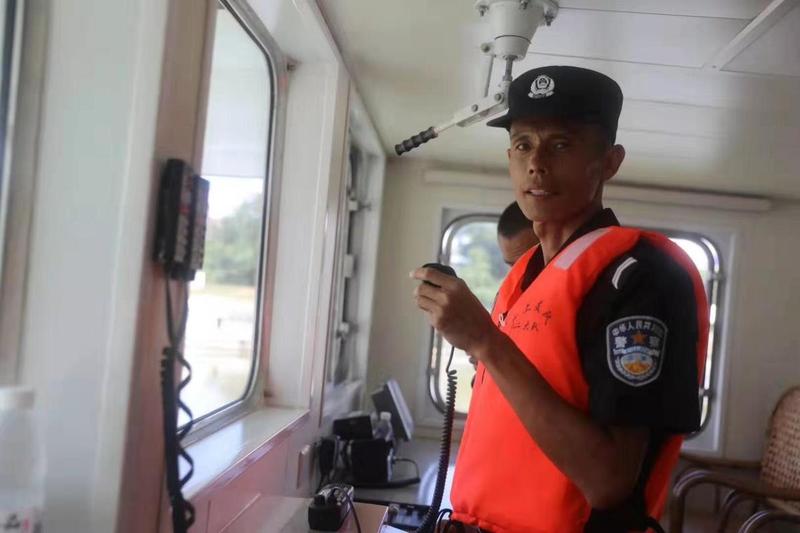 Tan Jianhua directs the ship via a walkie-talkie. (PHOTO / CHINA DAILY)
Tan Jianhua directs the ship via a walkie-talkie. (PHOTO / CHINA DAILY)
The captain: Tan Jianhua, 43
In October 2011, when the Chinese crew members were murdered and dumped in the Mekong River near the so-called Golden Triangle where Myanmar, Laos and Thailand meet, I was heartbroken and angry because some of them were my friends.
I knew it was sometimes dangerous to sail on the river, and I have witnessed hundreds of accidents and gained extensive experience in the region, but never in that way.
Before I came to the Mekong, I sailed in cargo ships in Chongqing, my hometown, on its stretch of the Yangtze River. I had graduated from a river transport services school just a year before.
In 1998, some friends told me I could earn more on the Mekong, so I decided to head south to Yunnan. When I arrived, I joked to a friend that compared with the Yangtze, the Mekong is more like a brook and it should be pretty easy to sail there.
I gradually worked my way up through the ranks. In 2004, I became a captain after four years' work, when I successfully piloted a 348-kilometer stretch of the Mekong from Jinghong in Yunnan to Chiang Saen in northern Thailand. That made me believe I could take the helm.
After decades on the Mekong, I am familiar with all the villages along the waterway and the hidden reefs and trees that lie in wait for unsuspecting mariners. But still, I did not expect the 2011 tragedy on the river could ever happen.
I am at about the midpoint of my career as a captain. After the shooting, I decided to spend the rest of my career ensuring safer navigation on the river.
In November 2011, in response to a call for experienced helmsmen, I became a surveillance officer for the Yunnan Border Patrol Department, undertaking marine patrols and law-enforcement duties on the river.
I was excited when I set off to patrol the river for the first time as a police officer. I was happy to see that old friends could navigate the river without worrying about their safety or their lives.
Some of my old friends left the river after the massacre, but some stayed in port and waited for things to improve. I chose to remain on the river because I have spent most of my career here and the river is part of my life.
Now, I have patrolled the Mekong more than 60 times, and every time I pass through the waters where my friends lost their lives, I cannot help thinking of them.
I am happy to see my fellow sailors working on the river in safety and making more money to support their families. I will give every ounce of my strength to guarantee that their journeys are safe.
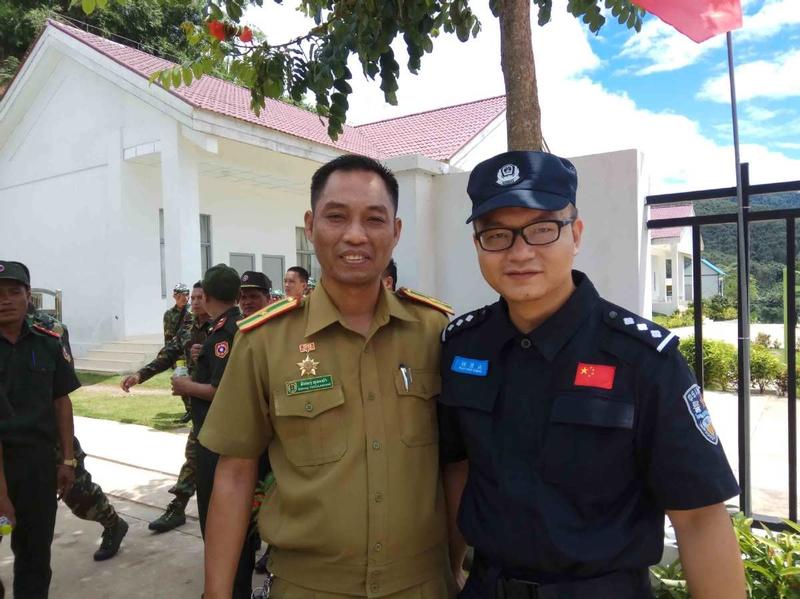 Bao Yongcheng (right) poses with an international police officer. (PHOTO / CHINA DAILY)
Bao Yongcheng (right) poses with an international police officer. (PHOTO / CHINA DAILY)
The interpreter: Bao Yongcheng, 33
There are three things I never expected: that I would major in Laotian at university; that I would become a surveillance officer for the Yunnan Province Border Patrol Department; and that I would marry a woman who would later become my colleague. All those things happened within a 10-year stretch.
I was born in Kunming, Yunnan's capital, in 1986. I was raised in an ordinary family, and my parents did not get a good education, so they wanted me to study and attend university.
ALSO READ: Wang: Lancang-Mekong nations will jointly tackle epidemic
When I graduated from high school at age 18, I applied to the English Department at Minzu University, Yunnan. I wasn't accepted, but the school told me they could transfer me to the Laotian department if I still wanted to study at the university.
I did not have many choices, so I agreed. It was a little hard at the beginning because except for the language, I did not have any idea about Laos. I was pretty upset, but I knew I had to work hard, both for myself and my parents, as they had done a lot for me.
Four years later, I heard that the border police department was looking for a Laotian interpreter for one of their stations. So without the slightest hesitation, I applied and was accepted.
When I was working at the station, I met my wife who had also studied at Minzu University, majoring in Thai. We clicked because we share many of the same hobbies and often exchange ideas about language.
Laotian and Thai are pretty similar, so sometimes we talk in those languages.
I worked at the station for four years until the murders on the Mekong in 2011. After that, I was assigned as a translator to a ship that was participating in joint patrols on the river.
READ MORE: Mekong River’s new aquamarine color may be sign of trouble
I have taken part in more than 30 patrols. I experience an enormous sense of achievement every time, because I can talk with policemen from Laos and solve problems caused by the language barrier.
I do not know where I would be and what I would be doing if I had not studied Laotian and worked for the border patrol department. More important, I do not know where I could find a girl like my wife. I feel grateful for everything I have achieved and experienced.


